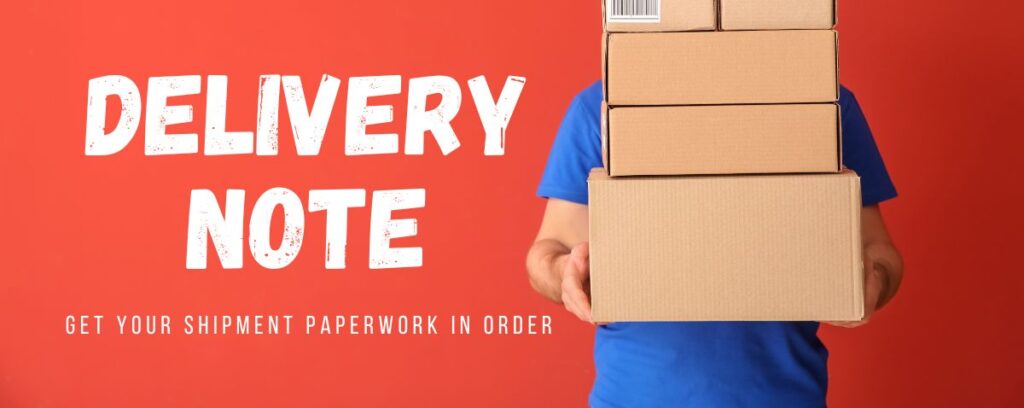In the world of commerce, efficient operations and customer satisfaction are paramount. Businesses that sell physical goods are constantly seeking ways to streamline their processes and ensure that customers receive their orders accurately and promptly. One essential tool that plays a pivotal role in achieving these goals is the delivery note. In this comprehensive guide, we will explore the merits of issuing a delivery note when a business ships goods to its clients.
What is a Delivery Note?
Before diving into the merits, let’s clarify what a delivery note is. A delivery note is a document that accompanies a shipment of goods, providing essential information about the contents of the shipment. It serves as a record of the transaction between the seller and the buyer. While it may be called different names in various regions, such as packing slip, shipping list, or despatch note, the purpose remains the same.
A typical delivery note includes the following information:
- Seller’s Details: Name and contact information of the business sending the shipment.
- Buyer’s Details: Name and contact information of the customer receiving the goods.
- Date: The date on which the goods are shipped.
- Description of Goods: A detailed list of the items being shipped, including quantity
- Invoice or Order Number: A reference to the corresponding sales invoice or purchase order, ensuring that both parties can easily cross-reference the documents.
- Shipping Method: Information on the method of shipment, including carrier details, tracking numbers, and expected delivery dates.
- Signature: A place for the sender or the carrier to acknowledge receipt of the goods.
Now that we understand what a delivery note is, let’s delve into the merits of using this valuable document in your business operations.
1. Accuracy in Order Fulfillment
One of the primary advantages of issuing a delivery note is the enhanced accuracy it brings to order fulfillment. When preparing a shipment, it’s common for businesses to pick, pack, and ship multiple items at once. In such a scenario, there’s always the potential for errors to occur. Without a clear record of the items in the shipment, it’s challenging to verify the contents of each order.
A delivery note acts as a checklist for the items in the shipment, allowing the person responsible for packing and shipping to ensure that everything is included. This not only reduces the likelihood of shipping incorrect or incomplete orders but also minimizes the need for costly returns and reshipments. In turn, this accuracy improves customer satisfaction and reduces operational costs.
2. Transparency and Accountability
Transparency and accountability are crucial in any business transaction. By providing a delivery note along with the shipment, a business communicates its commitment to transparency. The document details what was sent and when it was sent, creating a clear and traceable record of the transaction.
In case of any disputes or discrepancies, the delivery note can be used as evidence to resolve issues. This level of accountability instills trust in customers, assuring them that the business takes its obligations seriously and values their satisfaction. It also protects the business from fraudulent claims and disputes, as there is a documented record of the items shipped.
3. Streamlined Receiving Processes
A well-prepared delivery note not only benefits the sender but also the recipient of the goods. When a customer or a receiving department receives a shipment, they often need to check that all the items ordered have been delivered. Without a delivery note, this process can be time-consuming and error-prone.
However, when a clear and itemized delivery note is provided, the receiving party can quickly cross-check the contents of the shipment against the items listed. This expedites the receiving process, saves time, and ensures that no items are overlooked. Consequently, the customer can use the goods without unnecessary delays, enhancing their experience with the business.
4. Financial Record Keeping
Effective financial record keeping is vital for any business. The information contained in a delivery note is invaluable for the accounting department. It helps in reconciling sales and shipments, as well as tracking income and expenses.
By referencing delivery notes, businesses can accurately record when a shipment was made and its associated revenue. It also aids in matching invoices to specific shipments, ensuring that the business gets paid for the goods it sends out. In the long run, this record-keeping facilitates accurate financial statements, tax compliance, and better financial planning.
5. Inventory Management
Inventory management is a critical aspect of any business that deals with physical goods. Knowing what items are in stock, how much has been sold, and what needs to be reordered is essential for maintaining healthy inventory levels and avoiding stockouts.
Delivery notes play a significant role in this process. They provide data on the items that have left the warehouse, helping businesses keep track of stock levels and predict when to restock. This, in turn, prevents overstocking and understocking, ultimately reducing storage costs and lost sales opportunities.
6. Improved Customer Relations
For any business, building and maintaining strong customer relations is paramount. The consistent use of delivery notes sends a positive message to customers. It shows that the business values transparency, accuracy, and the customer’s overall experience.
When customers receive well-documented shipments, they have confidence that they are dealing with a professional and reliable company. This trust can lead to repeat business and positive word-of-mouth recommendations, further boosting the business’s reputation and growth potential.
7. Regulatory Compliance
Depending on the industry and location, there may be regulatory requirements regarding record-keeping and transaction documentation. In many cases, businesses are obligated to maintain records of their sales and shipments for a specified period.
Issuing delivery notes ensures that a business complies with these legal requirements. Failing to do so can lead to legal penalties and complications. Thus, using delivery notes not only benefits the business operationally but also ensures it remains compliant with the law.
8. Data for Business Analysis
In the age of data-driven decision-making, every piece of information counts. Delivery notes can serve as a valuable source of data for business analysis. By examining these documents, businesses can gain insights into their shipping patterns, popular products, and customer preferences.
This data can be used to refine marketing strategies, improve inventory management, and optimize the overall supply chain. It also aids in identifying areas for cost savings and operational efficiency, ultimately contributing to the business’s bottom line.
9. Cost Reduction
The merits of issuing a delivery note ultimately lead to cost reduction. By reducing errors in order fulfillment, streamlining receiving processes, improving inventory management, and enhancing customer relations, businesses can cut down on costly operational inefficiencies.
Fewer errors mean fewer returns and reshipments, reducing the associated shipping and labor costs. Streamlined receiving processes save time and effort, reducing labor costs and increasing customer satisfaction. Improved inventory management reduces storage and carrying costs. All these cost-saving benefits contribute to a healthier bottom line for the business.
10. Sustainability and Environmental Responsibility
In an era where sustainability and environmental responsibility are becoming increasingly important, delivery notes can also play a role. By ensuring that shipments are accurate and complete, businesses can minimize the need for returns and additional shipments. This, in turn, reduces the
Conclusion
In the fast-paced world of commerce, the merits of issuing a delivery note when a business ships goods to its clients are clear and compelling. This essential document serves as a linchpin of efficiency, transparency, and accountability in the supply chain. It benefits not only the businesses that use them but also the customers they serve.
From ensuring accuracy in order fulfillment to streamlining receiving processes, from enhancing financial record keeping to promoting better inventory management, the delivery note is a versatile tool that contributes to cost reduction and operational excellence. It also plays a pivotal role in building and maintaining strong customer relationships, enhancing transparency, and facilitating compliance with legal requirements.
Moreover, in the age of data-driven decision-making, delivery notes provide valuable insights for business analysis, enabling organizations to fine-tune their operations, reduce costs, and drive sustainable growth. By reducing errors and inefficiencies, delivery notes contribute to the bottom line and foster environmental responsibility by reducing unnecessary shipping and waste.
In conclusion, the use of delivery notes is not merely a matter of administrative convenience; it’s a strategic choice that positively impacts a business’s operations, finances, and reputation. Whether you’re a small e-commerce store or a large multinational corporation, the adoption of this simple yet powerful document can be a game-changer in your quest for success in the ever-competitive world of commerce. Embrace the merits of issuing a delivery note, and watch your business thrive.




